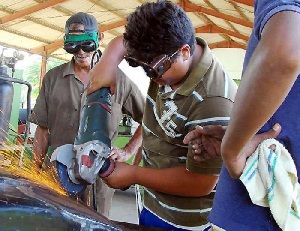 During the 2015-2016 academic year, beginning in September, high school students in professional-technical programs (ETP) will have three new options: social work, textiles and spinning. Although enrollment in these areas of study will be available only in the provinces of La Habana, Villa Clara and Holguín, the additions reflect efforts to broaden training available to the country’s future workforce.
During the 2015-2016 academic year, beginning in September, high school students in professional-technical programs (ETP) will have three new options: social work, textiles and spinning. Although enrollment in these areas of study will be available only in the provinces of La Habana, Villa Clara and Holguín, the additions reflect efforts to broaden training available to the country’s future workforce.
“More than broadening the specialties,” said Eugenio Ramón González Pérez, ETP national director, “We are attempting to broaden their profiles, and make training more comprehensive, so that, after graduating, the student has several forms of employment.
“Every year, enrollment in technical education is increasing, and above all in skilled worker programs. This is part of the strategy to correct the training pyramid: more workers, fewer technicians, and slightly fewer professionals,” González said.
Predicted for the coming academic year is an increase in enrollment at professional-technical high schools of 71,800 new students, distributed in training programs for skilled workers (more than 39,000) and intermediate technicians (32,000). By comparison, graduating this July are 10,226 intermediate technicians and 34,594 skilled workers.
On a national level, professional-technical education programs are in place at 506 poly-technical high schools serving 156,841 students, among these are 52 trade schools with an enrollment of 10,775 students, including 7,493 in penitentiary centers.
The majority of young women are studying services (beauty, gastronomy, sales, library), accounting, human resources management, veterinary assistance and computer science, while fewer are training in construction and industrial trades.
Teaching staff includes some 20,000 teachers in 96 specialties, among them many skilled professionals. Some 3,530 production specialists offer courses at poly-technical high schools.
Investments are being made in professional-technical education, across the country, including the provision of training kits and tools for a number of specialties. González Pérez reported that materials have been distributed to all poly-technical schools to support drawing, agricultural, electrical, tiling and sewing programs.
“Cases have been delivered with different tools for the trade schools, modules for cutting, machining, and welding metallic strictures, water supply installation and automobile repair, which have facilitated our work in the technical courses to guarantee the development of skills, without denying the strategic role the enterprise plays in the training of our students,” González Pérez said.
“These kits support the development of students’ professional skills within the poly-tech, and put them in a better position to enter workplace classrooms or any of the other formats available for entering the workforce at state entities.”
(Granma)